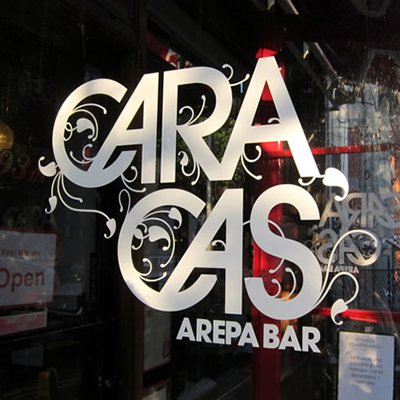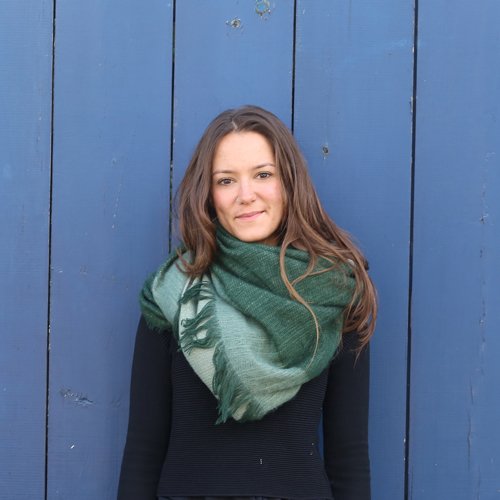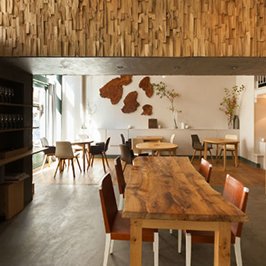Author: Editeur
Le Baratin
Taberna Rua das Flores
Mazi Mas
Niki Kopcke, a feminist chef and an activist entrepreneur
With international roots and a lifelong love of cooking and the sharing it implies, Niki Kopcke has created a restaurant business like no other: Mazi Mas*, in London. As a feminist and an activist, she was able to put her ideals in practice via her business. She creates jobs and offers them to women who otherwise could not find employment. The results are spectacular for these women: jobs, gains in confidence, empowerment, life changes.
With international roots and a lifelong love of cooking and the sharing it implies, Niki Kopcke has created a restaurant business like no other: Mazi Mas*, in London. As a feminist and an activist, she was able to put her ideals in practice via her business. She creates jobs and offers them to women who otherwise could not find employment. The results are spectacular for these women: jobs, gains in confidence, empowerment, life changes.

With a German father and a Greek-American mother, Niki Kopcke grew up in New York City and spoke 4 languages by the time she was 6.
Of all the people who helped her grow up, the one who made the strongest impression was her Greek nanny, Maria Marouli. A recent immigrant who could not speak English, Maria could not find work besides childcare, cleaning or cooking. As her husband would not allow her to start the business she dreamed of – her own bakery or pastry shop, she became a nanny, and she was Niki’s for several years.
The memory of Maria’s cooking stuck with Niki Kopcke forever, along with the early realization that many immigrant women like her have very limited options when it comes to seeking employment.
Later Niki Kopcke got a Master’s degree in Gender, Development and Globalization at the London School of Economics’ Gender Institute in 2010. She focused on the issues of poverty and development along with women’s rights.
« For migrating or refugee women who are also mothers, there are even more restrictions, and it is extremely difficult for them to find work. They are stuck,» says Niki Kopcke.
Jobs, not charity
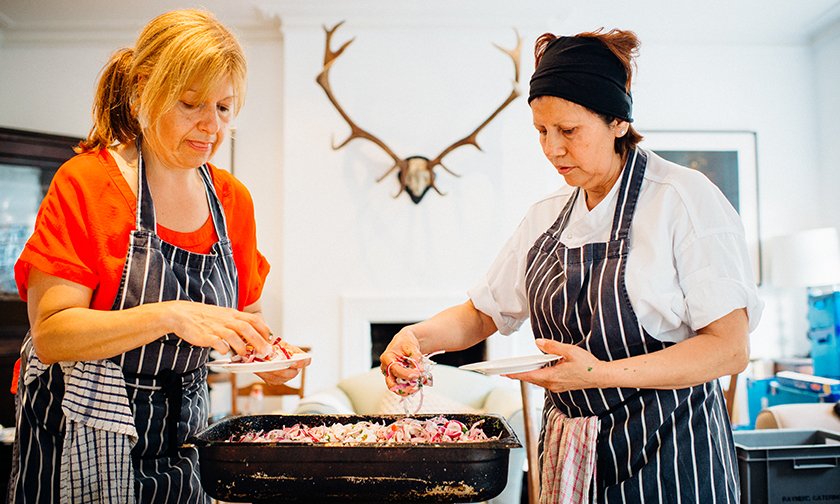
In 2011 Niki Kopcke started volunteering in a London charity kitchen that aimed to fight food waste by offering meals.
There she met another volunteer, Roberta Siao, who had first-hand experience of the issues Niki Kopcke had identified. As an immigrant and a mother of a then 8-year-old boy, Roberta Siao could not find a job matching her schedule, her skills in banking from a previous career in Brazil, or her education. She could volunteer, but no progression was possible from volunteering to employment.
Niki Kopcke saw this as « a waste of talent, passion, and energy ». She then came up with the idea of hiring the very women who could not find any work but casual work or volunteering.
This is how she started Mazi Mas* in London, first as a pop-up restaurant, then as a catering company, but always as « a business, not a charity, offering jobs to women who struggle finding one, and serving food to customers. »
It started with 2 women, then 3, then 10.
A restaurant with meaning
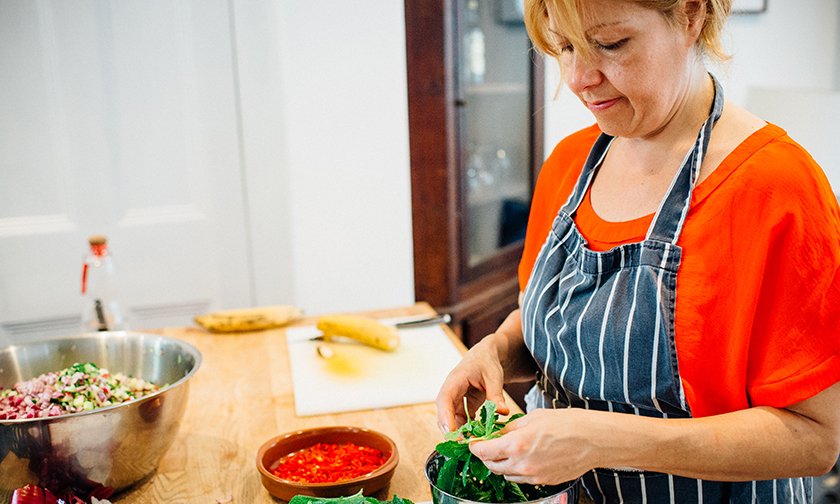
Niki Kopcke insists Mazi Mas* is a proper restaurant. « It is not a charity – we want to be competitive» she says. And the employees are paid a living wage, above the minimum wage, and above what most restaurant employees get. « Working for a living is good for their mental health and their self-esteem, » says Niki Kopcke.
She wants the employees to be visible, so that diners can « put a face on headlines and numbers about immigration. If you see somebody, if they cook your dinner, then you can’t hate this person. »
On every table diners can find a book telling the life stories of the women in the kitchen, so they know who is cooking for them. And they love those « dishes with a story to tell » as Niki Kopcke calls them.
She believes « the best meals are to be had in someone’s house. When I go out and eat Chinese food, I want what Chinese people have at home, not what is usually served in a Chinese restaurant. What we cook and serve is what people have at home, and this is special. »
And with a variety of cooks from a variety of countries (Ethiopia, Iran, Nepal, Nicaragua, Peru, Turkey, etc.), every night customers can choose from 5 starters, 3 main courses and 2 desserts, by women from 6 different countries. They cook each other’s dishes and learn other recipes than their native ones.
WHEN people get the opportunities they deserve
when people’s talents are ignored
Empowering women through cooking

The restaurant offers Niki Kopcke the opportunity to apply her feminist ideals. « My passion in life is helping people to recognize the work women do at home, because it is work we don’t acknowledge, which is not considered work – it’s a whole hidden economy. »
Niki Kopcke wants everyone to value this work and put a price on it.
The employees at Mazi Mas have « potential but not opportunities, whereas they have so much to give! » says Niki Kopcke. Too many of them were previously regarded as charity cases – and handouts were considered an adequate response to their situations.
Immigrant women, single mothers, women who have drifted away from the job market, are isolated and marginalized because they don’t have jobs. And they can be targeted by populists precisely because they do not work.
By offering them jobs, Niki Kopcke helps them become aware of their potential, and put it to work. Several of them have moved on and started their own businesses, or started working for traditional catering companies. Over Mazi Mas’* first 4 years of existence, 15 women have become professional cooks. « We are not a terminal employer, we are a springboard, » she says.
Niki Kopcke believes the best social program is one that creates jobs:
« You want social justice?
Create jobs.
You want to change things?
Create jobs. »
An ideal that could be adopted by many, in the food industry or elsewhere – so let’s! Everywhere and whenever an opportunity appears!
*Eláte na fáte mazí mas: come eat with us in Greek.
Thanks to Le Fooding for making it possible to meet Niki Kopcke,
during the event « Plats de résistance » in Paris
Plum Torte recipe
Niki Kopcke inherited this recipe from her mother, who clipped it out of “The New York Times” in the 1970s – and still has the clipping in one of the old binders where she has been keeping recipes since her twenties. It is one of the best cakes Niki has ever had – buttery and moist, with a beautifully tender crumb. It also happens to be extremely easy!
Niki Kopcke inherited this recipe from her mother, who clipped it out of “The New York Times” in the 1970s – and still has the clipping in one of the old binders where she has been keeping recipes since her twenties. It is one of the best cakes Niki has ever had – buttery and moist, with a beautifully tender crumb. It also happens to be extremely easy!
Continue reading “Plum Torte recipe”
Recipe parmesan light cream
At L’Ami Jean, every meal starts with a light and flavor-rich soup – a pleasant and traditional way to stimulate diners’ appetite. The one described here is easy to cook and features a quality classic : 24-month mature parmesan (the older the better). Something to warm hearts and bodies !
At L’Ami Jean, every meal starts with a light and flavor-rich soup – a pleasant and traditional way to stimulate diners’ appetite. The one described here is easy to cook and features a quality classic : 24-month mature parmesan (the older the better). Something to warm hearts and bodies !
L’Ami Jean
Stéphane Jégo, bistronomie for social inclusion
Bistronomie or Haute Bistro : the low-key and friendly atmosphere of a bistro with the high quality of haute gastronomy. Chef Stéphane Jégo has been practising this mix since he opened his restaurant L’Ami Jean (Paris, 7th arrondissement). While one of the goals of this movement is to make good, well-cooked products affordable, Stéphane Jégo is also using it to favor the social inclusion of people in distress.
Bistronomie or Haute Bistro : the low-key and friendly atmosphere of a bistro with the high quality of haute gastronomy. Chef Stéphane Jégo has been practising this mix since he opened his restaurant L’Ami Jean (Paris, 7th arrondissement). While one of the goals of this movement is to make good, well-cooked products affordable, Stéphane Jégo is also using it to favor the social inclusion of people in distress.
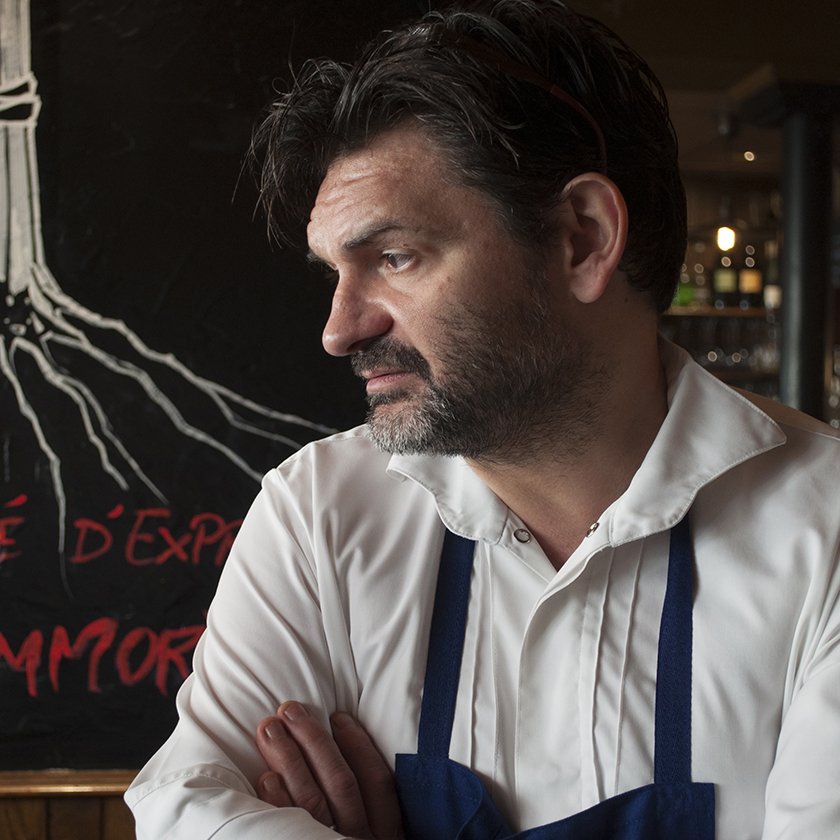
Stéphane Jégo was hired at restaurant La Régalade as soon as it opened, in 1992, and he learned a lot there. In his twelve years of service along his « second father » Chef Yves Camdeborde, he took an active part in the birth of bistronomie.
In 2004, when Britton Stéphane Jégo decided to fly solo and take over L’Ami Jean, the oldest Basque establishment in Paris, he kept « the soul and warmth of the place.» He offers « the same products, from the same suppliers, as those of Michelin-starred restaurants, but cooked and served with more freedom, in a more creative and independent way. » In a word, Stéphane Jégo brings together simpleness and quality to « make excellence affordable. »
Cooking as a social connector

Affordability for the clients, and access and inclusion for those in need, as he uses cooking as a way to open to others. « Cooking is an universal language, very useful to comunicate simply, most notaby with people in distress. »
For Stéphane Jégo, this language allows to « offer one’s skills and make them available to people in distress, who need to eat, of course, but who also need to share and enjoy. »
Chef Stéphane Jégo has helped French charity Secours Populaire, for instance. «I helped them discover good products, showed them how best to use them and how to cook them, gave a few tips and advice, and above all we shared the meal we had prepared together », is how he describes a cooking class with beneficiaries of the NGO.
Refugee Food Festival, duo with a Syrian Chef
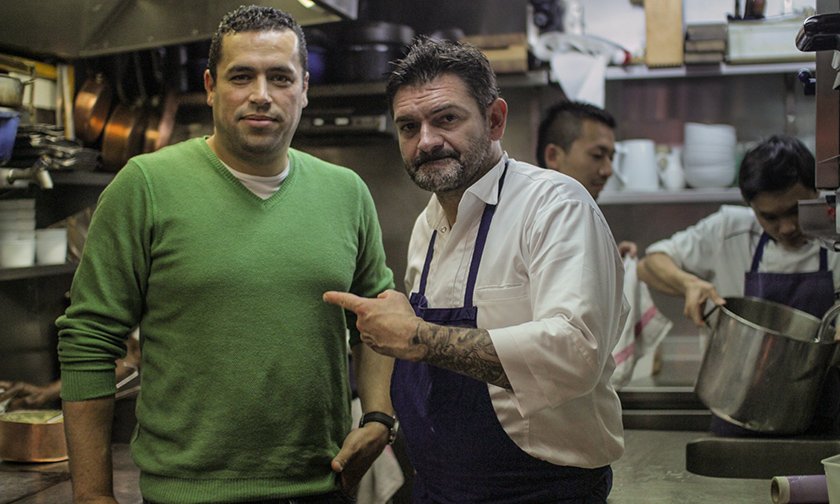
Stéphane Jégo was also involved with the first Refugee Food Festival, held in Paris last June, on the occasion of the World Refugee Day. What prompted him to do so was the opportunity « to at last shed a positive light on this tragedy. »
He welcomed Mohamad Elkhaldy to his kitchen for two four-hands sessions. This Syrian chef was forced to flee Damascus, leaving behind his two restaurants, his cooking school and TV cooking shows.
Stéphane and Mohamad, both passionate about cooking, met and communicated easily, undeterred by the language barrier, and energized by each other’s creativity and enthusiasm.
They thought up a menu mixing French and Syrian cuisines: kibbeh nayeh lamb tartar with smoked eel, courgettes in yoghurt stuffed with Galicia beef, pigeon with freekeh risotto; gum arabic ice cream, etc.
The experience allowed Stéphane Jégo to discover the professional and personal qualities of another Chef. « Apart from this political and humanitarian tragedy, we must not forget humans and their immense competencies. I am very proud to have been able to showcase Mohamad’s culinary talents. And I must say it has also been extremely beneficial to me. It is always enriching to discover another culture, new techniques, new products, new tastes. »
Stéphane Jégo’s public, and sometimes publicised commitments, would mean nothing if they were not matched by the same generosity in his restaurant, every day. He is indeed « the Mother Teresa of food » as his wife sometimes mockingly calls him.
Humanistic and fair, everyday
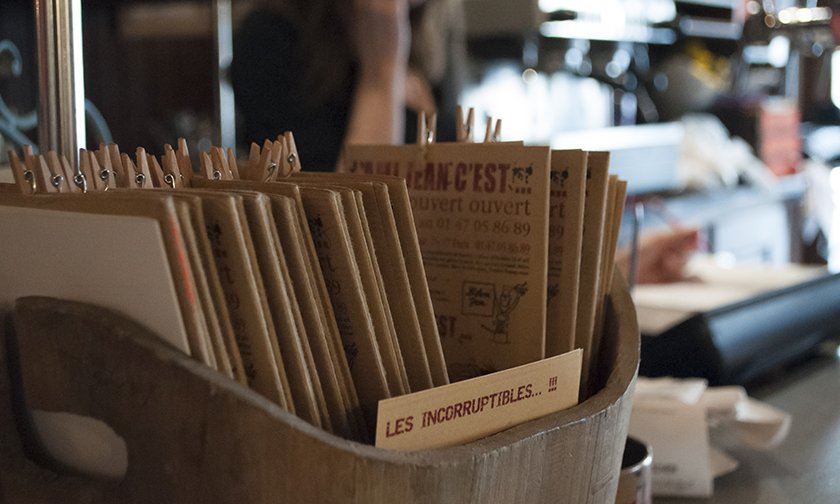
For this Chef, « respecting people is essential. »
Partly because he suffered harsh treatments in his years as a training cook, he wants to treat his apprentices right. « with these kids who come and work at L’Ami Jean for 2 to 4 years, we choose each other. They come and work for two days, and then they get a day off. After those 3 days, we sit down and talk – does he / she want to go on ?Am I ready to take them on ? If the answers are yes, I will invite his / her parents to eat and talk, to reasure them and make sure this is a family and collective decision. They are my kids ! »
These kids, along with the other kitchen staff and the dining room teams, are like an extended global family. Yuji, the deputy Chef, is Japanese, Boulay, a cook, is from Mali, apprentice Théo is from Vietnam, head waiter Mario is Romanian, etc. As Stéphane Jégo likes to say « what we do is manual work – speaking good French is not esential. What matters is gestures – passing knowledge by touch and feel. I do not want to give my staff mere tricks and recipes but a state of mind : they must work by and for themselves, they must build their own freedom. »
And the client too is free ! Free to discover L’Ami Jean’s, or rather Stéphane Jégo’s friends’ restaurants.
You can find a list of 15 of these right next to the dessert menu, and they are everywhere from Paris to the Basque country. « These are not competitors, they are friends. We share the same passion for Bistronomie. And we are actually about to unite even more visibly using the hashtag #CopainsCommeCochon (thick as thieves) to spread the movement! Coking is a key element to the growth of French presence worldwide, and we plan to participate actively. »
Foodies of the world, Stéphane Jégo and his friends await you to help you discover a generous and genuinely French cuisine : bistronomie !

